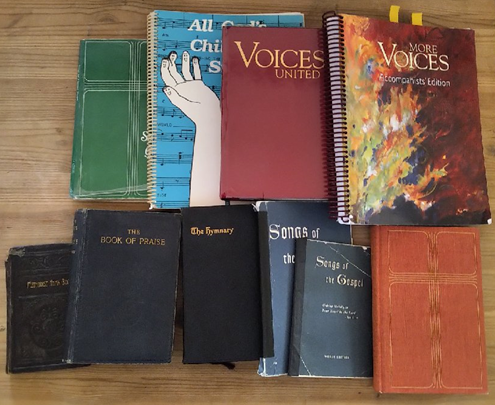The other day, I discovered a beautiful little nest sitting on my newly cut lawn (pictured here to the left). It looked like the adult birds had carefully built it right there and never used it. No eggshells, no feathers. It didn't even look like it had fallen from a tree. Perfect example of amazing architectural design then abandoned to the elements. Birds travel lightly, and do not hang onto their homes.
Given the chaotic state of airports these days, we can't say the same. Stories of lost luggage and cancelled flights are filling our news feeds and people describe the trauma this has caused them. I had a family member travel to New York one year who lost their luggage and never again will they put all their prescriptions in their checked suitcases! We don't know how to travel lightly. Unlike the birds.
Paul wants us to travel through life with at a light heart. He wants us to focus on dressing ourselves with peace and love and joy. And part of learning how to dress ourselves in that kind of Sunday best is by singing and praying and building community to get safety. Rather like a nest, we are woven into a place of safety that holds fragile beings growing in their ability to take themselves lightly.
I meet so many people living heavy lives of fear and resentment. They don’t have a safe space, and they don’t know that they need a safe space for learning to live more lightly. Often when they find out what I do for a living, they tell me how they left the church and the stories are full of anger and self-righteousness. It’s like they are saying, “See? That church was full of mean toxic people who hurt me. I was right in leaving and I am right in staying away.”
Which is a heavy mindset. It is stuck in fear, it is stuck in independence and self-protection. Sure, there are times we should walk away from toxic situations. And there are churches and groups and communities that people need to leave because they are toxic.
I get it. We don’t get through life without getting hurt by others, and we don’t get through life without occasionally hurting others, sometimes accidentally, sometimes with good intentions.
But. That doesn’t help us travel lightly. All too often people who have turned their backs on church haven’t worked through the anger and fear that life event triggered in them. They get stuck in resentment and anger.
They remember and retell the hurts over and over. Psychologists are discovering that when we tell and retell our trauma stories, there comes a point where it is no longer healing but can retraumatize us. It becomes a trigger for the same fight or flight adrenaline rush that we felt when the incident first happened. It entrenches our anger and self-righteousness. What if we experimented with forgiveness instead?
Both Paul and Jesus talked many times about the feeling of lightness that comes from forgiveness. We are supposed to forgive 70 times 7 and pray for our enemies. That’s not easy. Some think it’s about having positive feelings and thoughts about the person we feel wronged by, which I think is unrealistic. Others talk about the legal interpretation, which is giving up all claims to exacting punishment for transgressions, but we need justice and accountability in our world. I think that forgiveness can be choosing to let go of the retelling of our trauma stories in ways that hurt us. And learn how to strengthen ourselves to being more Christlike, with that heartfelt compassion, kindness, humility, gentleness, and patience Paul talked about. It doesn’t mean becoming doormats. It does mean letting go of our resentment of the person not being better than they are, situations not being perfect, and justice not being always fair.
Holding grudges, hanging on to old stories of grief and injustice, can be like a rock we put in a backpack. Every time we look at that rock, it gets a little heavier. If we start collecting more and more rocks and seeing every little incident as a rock we can’t forget, our backpack gets continually heavier until all we can think about is that backpack and we can’t move an inch.
Jesus invites us to take a rock out of our backpack, say thank you for the learning you gave me, then set it aside. Start small and work our way up. Start with the person who drove through that stop sign in a hurry or grabbed the last package of bargain-priced pizza from the store shelf. The bigger rocks that are really heavy may need help, get the lawyer, go to Together Talk or counselling. The hardest rocks may be about me – how do I forgive myself for being duped by that scam caller, that con artist on my computer, that stupid mistake I do over and over? Or bigger yet, how do I forgive God for the tragedy in my life?
Yes, sometimes we need to figure out how to forgive God. Maybe not for giving us that pony we prayed for, like Robbie did, but for the more serious problems. As far back as 1942 George Buttrick wrote about forgiving God this way: "If God is not, and the life of man poor, solitary, nasty, brutish and short, prayer is the veriest self-deceit. If God is, yet is known only as vague rumor and dark coercion, prayer is whimpering folly... But if God is in some deep and eternal sense like Jesus, friendship with God is our first concern, worthiest art, best resource and sublimest joy." Calling God loving parent, as Jesus taught, helps us forgive even that toxic image we have of God.
Forgive us our trespasses as we forgive those who trespass against us is only one part of the Lord’s prayer. May we pray it with persistence, humbleness and intentionality. And may we let go of all that weighs us down until we travel through life as lightly as birds. Amen.






